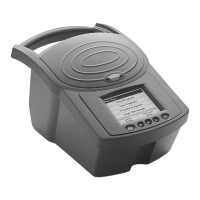Chlorine, Free
Chlorine, Free
ChlorineFre_AVPP_Other_DPD_Eng_Ody.fm Page 5 of 6
7. After completing the sequence, touch Graph to view the best-fit line through
the standard additions data points, accounting for matrix interferences. Touch
View: Fit, then select Ideal Line and touch OK to view the relationship between
the sample spikes and the “Ideal Line” of 100% recovery.
See Section 3.2.2 Standard Additions on page 32 for more information.
Method Performance
Precision
Standard: 1.07 mg/L Cl
2
See Section 3.4.3 Precision on page 44 for more information, or if the standard
concentration did not fall within the specified range.
Sensitivity
See Section 3.4.5 Sensitivity on page 44 for more information.
Summary of Method
Chlorine in the sample as hypochlorous acid or hypochlorite ion (free chlorine
or free available chlorine) immediately reacts with DPD (N,N-diethyl-p-
phenylenediamine) indicator to form a pink color, the intensity of which is
proportional to the chlorine concentration. Test results are measured at 530 nm.
Required Reagents
Quantity Required
Description per test Unit Cat. No.
DPD Free Chlorine Reagent Powder Pillows, 10-mL..........................1 pillow........... 100/pkg.............21055-69
or
DPD Free Chlorine Reagent AccuVac
®
Ampuls..................................1 ampul........... 25/pkg...............25020-25
Required Apparatus
Beaker, 50-mL............................................................................................1 ....................... each.................... 500-41H
Sample Cell, 10-mL, w/cap.....................................................................2 ....................... 6/pkg.................24276-06
Required Standards
Chlorine Standard Solution, 2-mL Voluette
®
Ampule, 20–30 mg/L .......................... 20/pkg...............26300-20
Program 95% Confidence Limits of Distribution
80 1.00–1.14 mg/L Cl
2
85 1.03–1.11 mg/L Cl
2
Program Portion of Curve ∆Abs ∆Concentration
80 Entire range 0.010 0.02 mg/L Cl
2
85 Entire range 0.010 0.02 mg/L Cl
2

